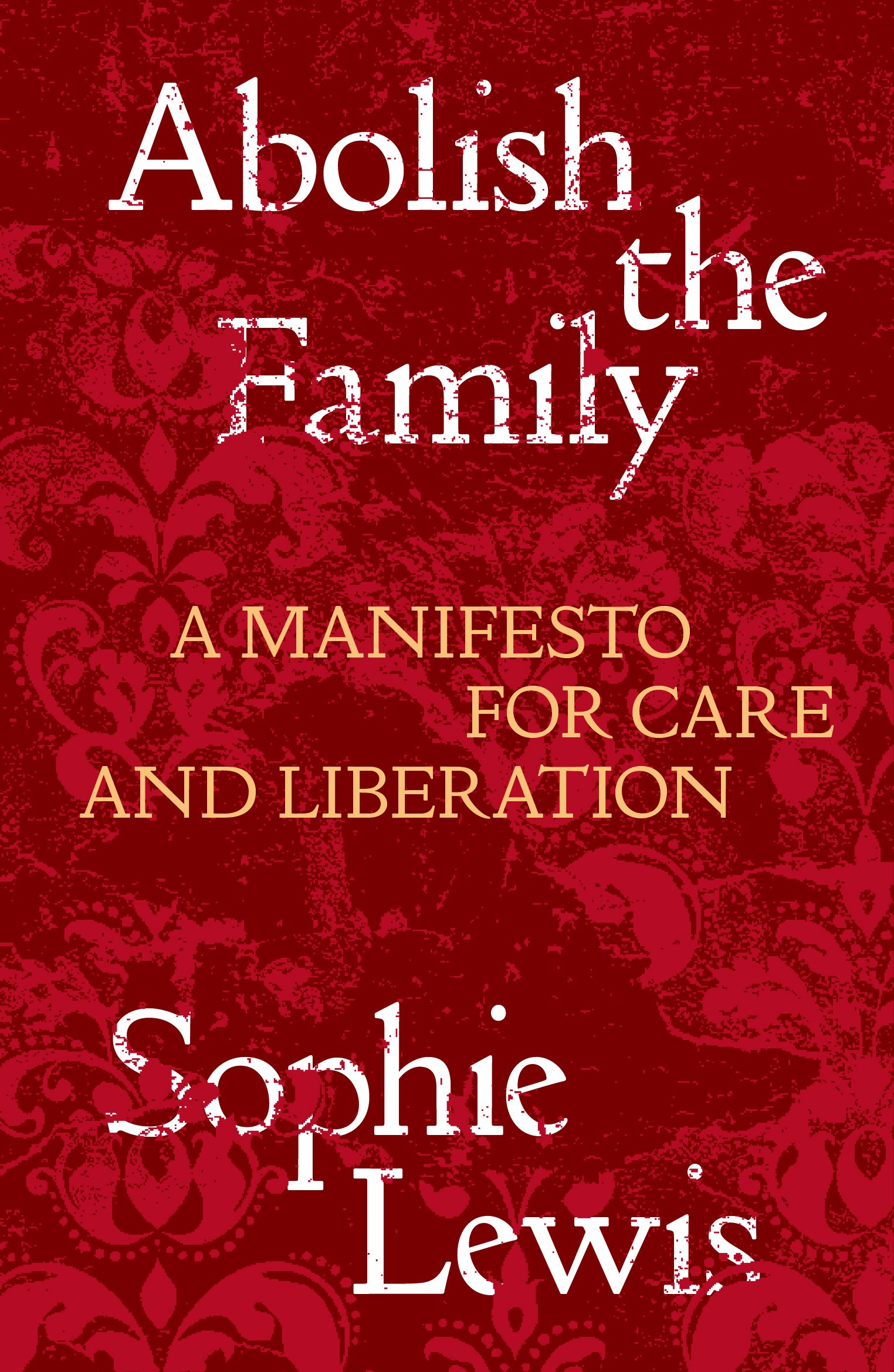
I LOVE A good manifesto, and Sophie Lewis’s Abolish the Family is just that. Anchored in a strikingly hopeful feminist Marxism, Lewis leads the reader through a systematic, didactic introduction to the politics and possibilities of cutting ourselves loose from the constraints and impositions of the traditional patriarchal, capitalist family.
Wisely, Lewis begins with an emotional negotiation, since part of the naturalization and success of the “family” as a concept is that it’s an emotional lodestone. As Lewis points out, with a characteristic combination of empathy and analysis, we’ve all been taught to conflate “family” and “love” to the point where it can be impossible to separate them, even though we know—as of course we do, from our own lives, popular culture, news media, and feminist theorizing—that families can be abusive and even deadly, that they are frequently stifling and restrictive, that they exploit women and children especially in ways that chiefly serve the interests of capital and patriarchy. Lewis’s focus on the role of care is central: the family privatizes caring relationships so strictly, and there are so few non-family arenas in which we might receive love and care, that our senses of security and belonging seem, both individually and culturally, to be inextricably tied not only to family but also to a particular type of family.
This belief that the patriarchal nuclear family is coercive and dangerous but also our “natural” and only option for human flourishing, Lewis argues, is part of the reason we benefit from asking whether there aren’t other and better ways to do things. The author, a professor at the Brooklyn Institute for Social Research and visiting scholar at the Alice Paul Center for Research in Feminist, Queer, and Transgender Studies at University of Pennsylvania, is a radical thinker about bodies, reproduction, and kinship. Her 2019 Full Surrogacy Now: Feminism Against Family (Verso) examines gestational surrogacy as a form of essential productive labor, ardently arguing in favor of the way that surrogate pregnancy helps to dismantle structures of hereditary family status by detaching gestation and even genetics from traditional ideas of which children “belong to” which parents and families. How can we, Lewis asks, view gestational surrogacy as part of a framework for loving and caring for one another, sharing our resources, and fulfilling our ethical responsibilities to our fellow human beings that are better than the demonstrably crappy and imbalanced one we’ve got?
In Abolish the Family, Lewis takes such questions and broadens their scope. The ubiquity of the heteropatriarchal family model and the venerability of its embeddedness in the power structures that scaffold our world can make it difficult even to think about other ways of organizing human networks. But, according to Lewis, there are plenty of other models available—if we’re willing to look for and learn from them. The manifesto’s second chapter looks particularly at Black feminisms and histories of Black kinship before, during, and after slavery for helpful examples of how we might begin to tease apart our ideas of how “family” interacts with oppressive ideas about race, gender, power, and property. Lewis goes beyond invoking the legendarily racist 1965 Moynihan Report, in which the then-assistant secretary of labor raised a bright white panic flag about the “tangle of pathology” that Black Americans created “without assistance from the white world” via unmarried Black motherhood and fatherless Black families, and even beyond Hortense Spillers’s classic scholarly rejoinder, “Mama’s Baby, Papa’s Maybe: An American Grammar Book,” which instructively traced the lack of bourgeois family structure in US Black culture to the intentional kin dislocations of slavery. Instead, Lewis looks at the work of numerous Black feminists, including Jennifer Nash and Tiffany Lethabo King, to consider the ways in which Black family making has served as a defense against white domination, as well as a way of resisting the idea of kinship-as-property-relation, upon which so much, including the system American slavery itself (in which a child born to any enslaved woman was also enslaved), historically rests.
There are so few non-family arenas in which we might receive love and care.
Similarly, in the impressive historical survey of the third chapter, Lewis attends to European colonizers’ deliberate and systemic use of the Christian-centric, patriarchal nuclear family and its values to squash and erase Indigenous ways of creating communities and cultures. The matrilineal, matrilocal structures central to many First Nations were violently suppressed by Europeans, who only recognized patriarchal power structures; common Indigenous practices like usufruct (shared use of and benefit from land and land-based resources) were unintelligible to those who understood property as both private and tied intrinsically to male-defined households and heredities. The now-notorious Indian residential schools run by the Bureau of Indian Affairs (US) and Department of Indian Affairs (Canada) deliberately removed Indigenous children from kinship groups, as well as their languages, lands, and communities, in the name of “civilizing” them into what pathbreaking Sisseton-Wahpeton Oyate anthropologist Dr. Kim TallBear has named “settler sexuality,” including naturalizing the privatized property and caregiving practices of bourgeois, patriarchal European family.
Lewis is smart to include such telling examples. Most of her readers, as she well knows, will not be immersed in or necessarily sympathetic to the socialist and communist arguments that form this manifesto’s historical and political DNA. For readers coming to the book without at least some background in Marxist feminism, combining the analytical language of economics with the squishy interpersonal realities of family relationships will be unfamiliar and possibly off-putting. Do not let this deter you. A manifesto should not be easily digestible. Utopian visions are inherently demanding; by definition, we’ve never seen anything like them before, so we’ve got to put in some work even to imagine the possibilities.

Houghton Library, Harvard University.
This is one of the reasons Lewis’s self-described “potted history” of family abolitionist thinking is so useful. Surveying the family’s long and diverse range of critics gives both context and teeth to family-abolition thinking. Lewis begins by referencing the well-known example of Plato’s Republic, in which Plato has Socrates conclude that the family must be abolished because it is unfair, the arbitrary result of accidents of birth. She moves on to colorful, fascinating historical figures like late-Enlightenment French silk merchant and sex-party theorist Charles Fourier. Unusually for his time, Fourier identified the single-family dwelling as one of the chief obstacles to improving the position of women in the world, imagining utopian communal housing that would eliminate “the woman-crushing norm of the private kitchen” in favor of shared kitchens and cafeterias. Less eccentric and more compelling than Fourier (who famously opposed bread and the number ten) we also discover the early twentieth-century radical, writer, diplomat, and self-described “sexually emancipated communist woman” Alexandra Kollontai. A globe-trotting polyglot ambassador for the USSR and one of the first women anywhere to hold diplomatic office, she argued at length and in numerous political books and propaganda novels in favor of separating sex and reproduction, instituting pay equality, and creating state-run childcare. After leaving her first husband and their child in order to go to Zurich and study Marxism, she joined forces with the Bolsheviks. In the wake of the overthrow of the Tsar, she helped draft legislation to enable women to divorce on demand and, in her late forties, scandalously acquired a new husband seventeen years her junior who would ultimately be executed by the Stalinists. (Where, oh where, is Kollontai’s biopic?) Getting a sense of the varied political motivations behind family abolition, as well as the wildly diverse proposals for enacting it, helps the reader appreciate the potential and perhaps the appeal of this radical idea.
The manifesto’s final chapter, “Comrades against Kinship,” is its weakest. This is frequently the case with manifestos precisely because they are ideological documents, not user manuals. Even in cases like this one, where an author has experience of a real-world manifestation of some or all of the ideological principles they are espousing—in this case, the Camp Maroon or James Talib Dean Homeless Encampment that took place in Philadelphia over the summer of 2020, occupying space and protesting on behalf of the interests of the unhoused—it’s difficult to make the conceptual leap from a small, localized, and temporary embodiment of a particular set of principles to one that would encompass a culture, a nation, a world.
Lewis is honest enough to acknowledge this, and in so doing, she makes a worthy stab at creating some usable goals. “[W]e could seek,” she writes, “to isolate that which is liberatory about the kinship-ideal,” which she identifies as reciprocal care, interdependence, and belonging. And yet, as she also remarks later in an aside about the language we use to talk about the relationships that provide these things, “we need concepts with more bite,” like the notion of kith as opposed to kin, or perhaps an invigorated idea of comrade. It isn’t a comprehensive and implementable vision for family abolition, but the prospect of unpoisonous care, unmanipulative interdependence, unpatriarchal power, and uncoercive belonging is still worth our attention. Who knows, perhaps this little manifesto will take us another step or two along the way.

